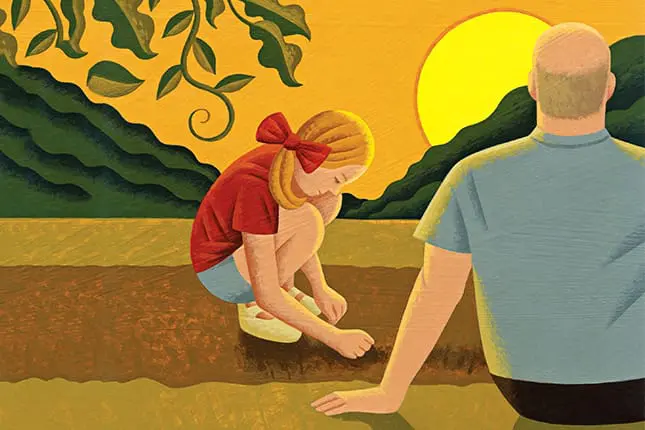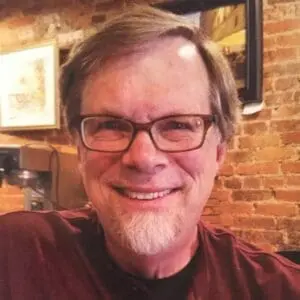Enjoy the audio preview version of this article—perfect for listening on the go.
Gianna—18 months old, with a broad smile, tangled strawberry hair, dancing blue eyes—begs me to play her favorite game as she flops onto her parents’ kitchen floor. I happily agree, taking hold of her noodly arms and beginning to swish her back and forth as she howls with laughter. After several minutes, though, my face is beet red, and my back is aching. I slow down, hoping she won’t notice, but she urges me on. I speed up again, now panting hard and finally suggesting that we’re getting close to the end of our game. “One more time,” I say in a breathless, though pleasant voice. Gianna hears something different: “More more time!” she cries, thinking I’m committing to an endless round of pull-my-granddaughter-around-the-kitchen-floor-by-her-arms. No matter how many times I say “one more time,” Gianna hears “more more time,” eventually believing that’s the name of the game.
That was in 2010, when I was still in my first year of retirement, trying to figure out what I was going to do with “more more time,” now that the clock didn’t completely rule my life. That year teemed with questions. What would I make of my life now? How would I traverse the road ahead? Would this be a time of creative reassessment and new ventures, a period of ripening more than aging, a yeasty time of promise? Or would it be life’s Big Step Aside—where I end up forever on the platform watching the train whiz by, its cars full of eager, driven, productive people who are still utilizing their talents and reaching their goals? Even worse, do I really have “more more time”? Or is that an illusion, a veil hiding the ugly fact that there’s very little time left at all? Is the road ahead wide with hope, or is it just a slippery slope leading to the Final Parking Lot? When I read the obituaries (and you’ll read them, too, once you retire), everyone is my age—or younger!—and they’re all smiling. Why? Do they know something I don’t? All this ruminating made me think, Gee, my robe feels so nice and warm this morning, my tea is just right, maybe I’ll stay in bed.
Don’t get me wrong. I retired eagerly and gladly, yet once I arrived on the shores of this new land, I wasn’t sure how to get oriented. Compass, please! Map, anyone? Perhaps, I thought, I could approach this phase of life like those aging movie stars on the covers of AARP Magazine, smiling as if to say, “Gosh, why couldn’t I have gotten older sooner? It’s such fun!” Or I could let the Merriam-Webster Collegiate Dictionary be my guide, despite the fact that in defining retire it uses the word withdrawal eight times, as well as recede, retreat, and seclude. But somehow I was skeptical about AARP’s insistence that retirement (code for aging) can be an endless romp on the beach at Boca. And Merriam-Webster made me feel like I should throw in the towel or wave a white flag.
Throughout that first year, I remained confused. I lay awake at night thinking about retirement, about the past, about the future, about what I’d done along the way, about what I’d like to do, until slowly it all morphed into a basic, though more elusive, question—one about time itself. All my adult life, I’ve lived by the day planner, often in hourly increments. What was written on its pages and how I organized my time devoted to its activities defined me, moved me forward, gave my life meaning. Despite complaining that every moment of every day was booked, sometimes for months in advance, I wore the burden of an overly scheduled life with honor and experienced a kind of peace because of it—the peace that comes from the naive assumption that if I had an appointment next week, if I was scheduled for a presentation next year, I’d be there. Time wouldn’t mess with me; it wouldn’t cut me short! I was safe because I was An Important Person Doing Important Things, and had a growing CV to think of.
I’m now in my third year of retirement, and sometimes I can’t remember what day it is. That’s not to say that I don’t have a calendar or commitments, but time is a different thing when the clock is no longer in charge. Gianna is 4 now. We don’t play “more more time” any longer. Yet I still wrestle with wanting more more time myself, because—though I often wish it were otherwise—nothing can change the fact that there are far fewer grains of sand in my hourglass than before, and that the total will dwindle further with each passing moment, hour, day.
When I was Gianna’s age, I didn’t know there was such a thing as time. In my teens, I often felt that time stretched out before me like an endless red carpet I could walk down forever. Marriage entered the picture in my early 20s, and a career. Then came children—and growth, change, pain, celebration, thankfulness, accomplishment, failure, reassessment, and leave-taking, then aches and pains that don’t go away, fathers who die, mothers who age, and grandchildren . . . beautiful grandchildren. With age and experience, I realize that time is a delicate construct at best, something more fragile than I ever allowed myself to believe all those mornings, all those years when I dutifully rose to meet each day.
“Hi, Dad, this is an emergency. . . .” Our eldest daughter was eight months pregnant when I got this call. I drove through a snowstorm, my wife following from work, and found our daughter sitting in their car, my son-in-law standing outside waiting for me. We exchanged barely a word as they sped off to the hospital. My wife and I found the frightening evidence of our daughter’s abruption inside the house, and—not knowing what else to do—dutifully and silently cleaned it up while Gianna slept in her room, unaware.
Makayla weighed barely four pounds when she was born, 12 minutes after her mommy and daddy had reached the hospital’s emergency room. The next morning, the doctor told our son-in-law that had they arrived 15 minutes later, both our daughter and granddaughter would have died. The next day, my wife announced that she was going to retire. As she put it simply, “Life’s too short.”
She’s right. Our time here is fleeting at best, a shooting star across the night sky. In recent months, I’ve been reminded of this over and over again: a 23-year-old acquaintance awaiting bone-marrow transplantation; a brother-in-law in surgery for 11 hours; a former coworker committing suicide at the end of a long work day; a best friend’s father dying slowly in a hospice, at peace, his only complaint being “I didn’t think it would take so long.”
Gianna and I are sitting in the garden in the far corner of the backyard. It’s early spring. The sun shines bright and warm through the budding oaks and ashes that surround us, but the air is cool, hanging onto the memory of winter. We’re digging in the dirt in search of bugs and, hopefully, squishy worms. My wife is walking across the lawn toward the swings, holding Makayla’s hand. Now 2 years old and a delightful red-haired imp, Makayla is talking and gesturing with her tiny arms as my wife laughs. Gianna jumps with delight as I pick up a worm for her inspection. I look at her face and see her mother at the same age.
I lean back on my hands and take in the whole scene. I feel like I’ve dropped through a trapdoor in time and entered a vast banquet hall, in which I float, feasting on every sensation, grateful for every molecule of experience. I think, This is it—and as soon as I do, it is gone, unwilling to be captured by any words, any definitions I might apply.
Of course, somewhere inside, I knew it all along. “More more time” isn’t about more anything. It isn’t about duration. It’s about the fullness of time, the expansiveness of an unprotected moment, when everything that time has to offer is awakened in the endless present. It is no more available now that I’m retired than it ever was. It has always been here, calling to me through every single moment of every single day that I’ve lived. The only advantage I have in retirement is that, from time to time, I wait and watch and listen.
Illustration © Adam Niklewicz
David Seaburn
David Seaburn was an Assistant Professor of Psychiatry and Family Medicine at the University of Rochester Medical Center for nearly 20 years, where he was Director of the Family Therapy Training Program (Psychiatry) and Coordinator of the Psychosocial Medicine Rotation (Family Medicine). He’s the co-author of Family-oriented Primary Care: A Manual for Medical Providers (1990) and Models of Collaboration: A Guide for Mental Health Professionals Working with Health Care Practitioners (1996) and the author of nine novels, including Darkness is as Light (2005), Pumpkin Hill (2007), Charlie No Face (2011), Chimney Bluffs (2012), More More Time (2015), Parrot Talk (2017), Gavin Goode (2019), Broken Pieces of God (2021), and Give Me Shelter (2022). He was a founding member of the Collaborative Family Healthcare Association and its former Treasurer. In 2005, he left the Medical Center to become Director of the Family Support Center in the Spencerport Central School District, a free counseling center for students and their families.













